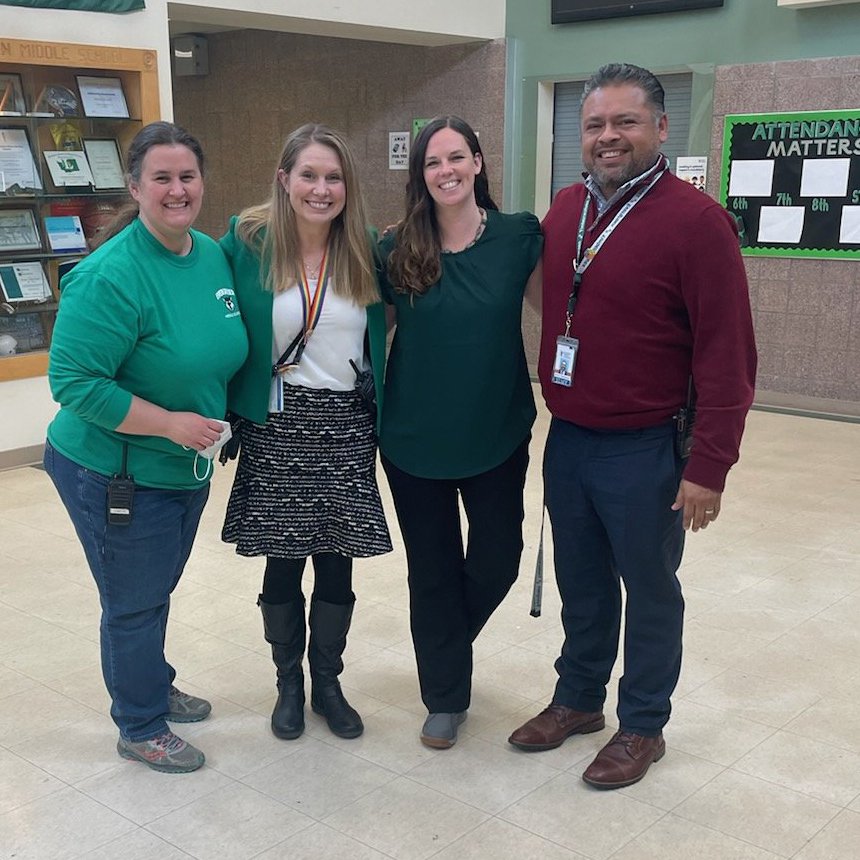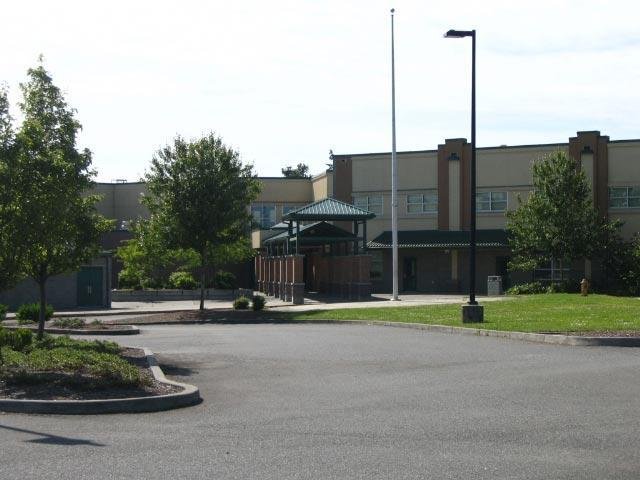
Evergreen and ANet colleagues from left to right: Nicole Carter, academic coach; Michele Waddel, principal; Colleen Kelly, ANet coach; and Dr. Melvin Bustamante, assistant principal
When the 21/22 SY began, students at Evergreen Middle School in Everett, Washington, were finally back in classrooms. Things should have started to feel normal again, right?
Nicole Carter, an academic coach at Evergreen Middle School in Everett, Washington, wasn’t quite so sure. She says she was seeing a lot of “elementary [school] behaviors in middle school bodies” at the beginning of the school year. Carter, who is an assets-based educator, knew that her students were capable of more and was deeply compassionate to their struggles–after all, how could an educator not expect disruptions in students’ academic and emotional regulation skills after experiencing alongside them the uncertainty and anxiety that has gripped the education system since March of 2020?
Everett’s team was already leaning into social-emotional learning work but knew that they would need to do even more this school year and beyond.
Everett, alongside four other schools across the country, launched the school year by participating in a research-based pilot program established in collaboration between Achievement Network (ANet) and Transforming Education.
The purpose of the pilot? To support the integration of whole-child, social-emotional learning (SEL) and academics to create more meaningful educational experiences for students as a result of an increased sense of community and belonging.
ANet’s long history of ensuring students’ academic success combined with Transforming Education’s expertise with fostering whole-child development will ensure that students receive an integrated educational experience that focuses on the head and the heart.
Schools like Evergreen were invited to join the pilot because they had already laid a solid foundation of social-emotional learning in their buildings but were looking to integrate social-emotional learning and academics more intentionally. Evergreen, in particular, was actively engaging in a daily practice called Den Time, which ensured that social-emotional learning was a daily focus for every student; every teacher; every member of the Evergreen community. When offered the chance to tackle academics directly alongside social-emotional learning, Everett school leaders jumped at the opportunity.
One of the more exciting developments as a result of the pilot program is the increase in both student and teacher agency at Evergreen.

Evergreen’s instructional leadership team from left to right: Dr. Melvin Bustamante, assistant principal; Michele Waddel, principal; Monica Haule, assistant principal
Monica Haule, assistant principal, says, “Kids are not only taking charge of their learning, they’re taking charge of the improvements here.” She describes how one group of students decided to start a recycling club at the school. She attributes this shift in student mindset to the boost in the confidence students receive as they learn content through productive struggle and the use of academic discourse. The momentum of these small, daily victories carries students into their next academic engagement and ultimately into their everyday lives. Evergreen’s instructional leadership team is confident that they are setting their students up to be lifelong learners.
Teachers, too, feel empowered due to the shifts Evergreen has made this year. Principal Michele Waddel says that many of her teachers previously expressed feeling pressure to “teach more material than there are days in the school year,” but their work with ANet coach Colleen Kelly has shown them how to intentionally “chunk” standards. This has ultimately enabled teachers to take back instructional time and relieve some of the pressure they have felt, particularly around mathematics instruction. This work is part of Everett Public School’s district-level strategic initiatives that will ultimately enable Evergreen and other schools in the district to build effective instructional practices for equitable educational experiences for all students within the district.
Evergreen’s participation in the pilot is also addressing another focus area for the school: educational equity.
The school’s instructional leadership team is well aware of the inequities that exist at Evergreen, a school–like many others–where their students often arrive performing several grade levels behind. Additionally, despite having fewer students than their neighboring comprehensive high school, middle schoolers at Evergreen were receiving more discipline referrals than the students at the high school. When Principal Waddel arrived at the school more than four years ago, she knew that she would need to tackle these issues to ensure that her students received the high-quality, equitable instruction they deserved.

Evergreen Middle School in Everett, WA
One way they are working to address these inequities is by converting their “dependent learners” to “independent learners.” As academic coach Nicole Carter says, “we create dependent learners out of students [who] we don’t think can achieve.” By challenging deficit mindsets in teachers and instructional leaders alike at Evergreen, Evergreen’s instructional leadership team ensures that teachers are equipped with the necessary skills to ensure all students access to the high-quality, grade-level teaching and learning they deserve. Assistant principal Dr. Melvin Bustamante believes that these shifts in mindset and practice will ultimately “open the floor” to all students: all-student participation, all-student engagement, and all-student-centered classrooms.
Momentum is building at Evergreen Middle School; the school’s instructional leadership team is excited to see how they can continue to build on the foundation they have laid over the last few years by implementing an integrated approach to academics and social-emotional learning, a focus on the head and the heart.
